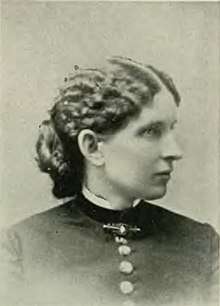Sarah Dyer Hobart
Sarah Dyer Hobart (pseudonym, Floyd Bentley; September 20, 1845 – November 1, 1921) was an American author of poetry, prose, and songs. Some of her more notable poems included, “The Record of Company B”, “The Legend of St. Freda”, and “Hector's Recompense”.[1]
Sarah Dyer Hobart | |
|---|---|
 a Woman of the Century | |
| Born | Sarah Dyer September 20, 1845 Otsego, Wisconsin Territory, U.S. |
| Died | November 1, 1921 (aged 76) |
| Resting place | Fall River Cemetery, Fall River, Wisconsin |
| Pen name | Floyd Bentley |
| Occupation | author |
| Language | English |
| Nationality | American |
| Genre | poetry, prose, songs |
| Spouse | Martin C. Hobart ( m. 1866) |
| Children | 3 |
Early years and education
Sarah Dyer was born in Otsego, Wisconsin Territory,[2] September 20, 1845,[3] or 1846.[1] Her father, Wayne B. Dyer, was the first man to make a home in the town, having arrived in Otsego in May 1844.[4] Her parents were among the earliest settlers in that part of the State of Wisconsin, and her early life was that of a pioneer. Her parents were intelligent and ambitious for her, and gave her all the assistance in their power. She became a well-educated person.[3]
Career
She commenced her literary career at the age of eighteen, and was a contributor to the periodical press ever since. Her poems soon made her name well known, and her sketches added to her popularity. Hobart's sonnets are perhaps her best work.[3] For nearly fifty years, she wrote for the press using various pseudonyms. Her poems appeared in the leading magazines, including the Century, Lippincott's Magazine, Outing, and others. She was a regular contributor for a number of years to Harper's Bazar.[2] As a regular prose contributor to the Toledo Blade, she wrote over the nom de plume of “Floyd Bentley.”[1] By 1880, she had turned her attention almost exclusively to writing melodies.[1]
Personal life
In 1866, she married Colonel Martin C. Hobart, who had just returned from the American Civil War. They had three children —Frances M., Mary V., and Burr E.—[5] and lived in Fountain Prairie, Wisconsin.[3] Hobart died in November 1, 1921, and was buried at Fall River Cemetery, Fall River, Wisconsin.[6]
References
- Butterfield 1880, p. 552.
- Hills & Luce 1907, p. 152.
- Willard & Livermore 1893, p. 382.
- Butterfield 1880, pp. 552, 833.
- Butterfield 1880, p. 1066.
- "Fall River Cemetery, Fall River, Wisconsin - Burial Records". www.interment.net. Retrieved 23 December 2017.
Attribution



External links
| Wikisource has original text related to this article: |